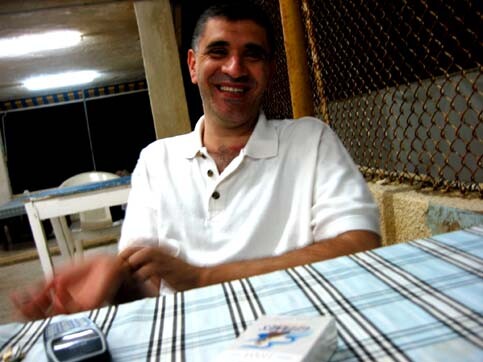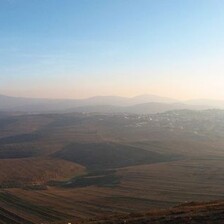The Electronic Intifada 3 September 2005
This interview provides a critical perspective on the changing face of Lebanon’s politics from an important literary figure in the country, Samah Idriss. Samah is a co-founder of the Campaign to Boycott Supporters of Israel and editor-in-chief of al-Adab, a Lebanese arts and culture magazine based in Beirut
The interview was conducted in August 2005 in Beirut, Lebanon and addresses various issues relating to the present day politics of Lebanon, while providing regional context to the major political changes taking place in Lebanon. Idriss addresses the wave of “opposition” demonstrations, which took place following the assassination of former Lebanese Prime Minister Rafik Hariri, the following Syrian withdrawal from the country and the recent Parliamentary elections. Idriss also discusses the relationships between political figures in the country, like Rafik Hariri, with Syrian political and economic elites prior to his death, and focuses on the relationship between Lebanese politics and the Palestinian struggle for liberation.

Samah Idriss of the Campaign to Boycott Supporters of Israel in Lebanon (Photo: Stefan Christoff/EI)
Can you comment on the recent Parliamentary elections in Lebanon, specifically I am interested in your perspectives regarding the relationship between the elections and the wave of “Opposition” demonstrations in Lebanon, demanding the withdrawal of Syrian troops from Lebanon….
The street demonstrations had very little to do with the outcome of the recent Lebanese Parliamentary elections. The outcome of the elections had everything to do with the decision of the Syrian regime to withdraw its military, due to fear of the possible repercussions resulting from U.N. Security Council Resolution 1559.
Also the U.S. had decided it was time for the Syrians to leave Lebanon if they were not going to accept to liquidate Hezbollah, disarm the Palestinian camps and cooperate with the “Road Map” by pressuring the Palestinians to halt their legitimate war of attrition against Israeli occupation, while also completely preventing “infiltrators” from killing U.S. soldiers and “civil” contractors in Iraq.
Clearly Syria could not fulfill the last two demands. Palestinians are fighting their own battle for liberation. Similarly, the bulk of military operations in Iraq have little to do with infiltrators from countries bordering Iraq; the U.S. military has itself confessed that less than 5% of the fighters in the Fallujah uprising were non Iraqis.
Syria could not do more than exert pressure on the Palestinian leadership in Damascus, which it did, as today Palestinian factions barely have media offices in Syria. On the Iraqi front, the Syrians have indeed captured many pro-Saddam loyalists and also handed over some “Islamic infiltrators” to their respective merciless regimes.
Also Syria built a wall on the Syrian-Iraqi border to prevent people from crossing into Iraq, although not as high as the Israeli Apartheid Wall! The Syrian government even requested that the United States provide special nocturnal binoculars, similar to those used by the U.S. government in an attempt to prevent Mexican migrants from entering the U.S.
Concerning Hezbollah, Syria can not attack this party as it would be too costly for its close relationship with Iran, particularly at a time when the U.S. is threatening to bomb Iran into oblivion if it does not halt its peaceful nuclear projects.
In short, the U.S. needed a quick and easy victory to compensate for all its failures in the region, especially in Iraq and Palestine, and what could be more promising, the US thought, than Lebanon, a country that is already tormented by decades of Syrian despotism and patronage?
What made the US task all the more promising was the fact that Lebanon already contains parties which had worked hand in hand with the Israelis, such as the Lebanese Forces, and with the U.S., such as the Free Patriotic Movement led by Michel Aoun — a former military general.
The U.S. and France pressured the U.N. Security Council to adopt Resolution 1559, and Syria withdrew — not out of fear of the Lebanese demonstrations — but out of fear of being possibly subjected to a similar fate as Iraq under Saddam.
People should also be aware that the Syrian intervention in Lebanon, which began in June 1976 during Lebanon’s civil-war, took place with the total approval of the U.S., and specifically Henry Kissinger, in an effort to halt further Leftist-Palestinian advances against right-wing militias in Lebanon. In 2005, it was time for the same country that once approved the Syrian intervention to demand its withdrawal, in order to present to the U.S. public and project internationally another “victory for democracy,” similar to the Georgian and Ukrainian “victories”.
As a result of US interference for the sake of “democracy” we have come out of the recent parliamentary elections with a replica of the pre civil war political scene. Old warlords are back on stage and in control of the country, such as Jumblat, Berri and Ja’ja’. However new players have also entered the scene, such as Sa’d al-Hariri, who is in no way against the U.S. policy in the region, and Hezbollah, with which the U.S. is willing to deal “only” if it disarms itself; i.e. if it accepts to be put at the mercy of Sharon and Israel’s Defense Minister Shaul Mofaz!
Condemnation of the American pro-democracy ruse does not mean admiration of Syria, however. It is important not to ignore the major flaws that the Syrian regime has committed in Lebanon, for those were in fact responsible for the anti-Syria feelings represented by the huge opposition demonstration in Beirut on March 14th 2005 and during the recent elections.
Concerning the Syrian presence in Lebanon…. Many Lebanese have stated that the long-standing Syrian political & military presence in Lebanon could not have been possible without complicity from Lebanese elites at the highest levels. Throughout the Syrian presence in Lebanon many political leaders, who now form the “opposition” played important roles. So can you expand on the complicity of Lebanese political leaders in the Syrian presence in Lebanon and specifically those who throughout the past year have called for Syrian withdrawal….
Many politicians who called for the Syrian withdrawal were major beneficiaries of the Syrian presence in the country. The Progressive Socialist Party of Walid Jumblat benefited from the Syrian tutelage, acquiring more power in government positions and more control throughout the civil-war in “Druze” areas of the country. Until very recently any person who criticized Syria was denounced by Jumblat as an Israeli or US agent or ally! Jumblat never accused the Syrians of killing his father Kamal Jumblat, the head of the Lebanese National Movement, a coalition of Leftist pro-Palestinian parties, despite his later “conviction” that it was the Syrian who did it on March 16th, 1977.

A poster of the late Rafik Hariri, which continue to line the streets of Beirut today. (Photo: Stefan Christoff/EI)
In this context one should have the honesty and courage to proclaim that the Syrian presence in Lebanon would not have been disastrous had it not been for the complicity of Lebanon’s elites, including those who have retained power after the Syrian withdrawal, such as followers of Berri, Hariri, Jumblat,….
Regarding Palestinian refugees in Lebanon, can you speak about what importance you give toward those Palestinian refugees living in Lebanon and the political changes taking place in the country. Do you feel that the Palestinian refugee “issue” should be included in general political discussions on the future of the country….?
I have always firmly believed that there can be no real reform in the region, and even in the internal politics of Lebanon, if the Palestinian refugee issue is not taken into full account.
There are over 300,000 Palestinian refugees in Lebanon, and there is one and only solution for their plight: their right to return to their homes and villages throughout historic Palestine, including what is now called the state of Israel. There can be no just solution for the Palestinians, or a glorious present and future for Lebanon itself, if the Palestinian refugees are not granted their right to return.
Having said that, one must add that until Palestinians can return to their land they must be granted all their civil and political rights in Lebanon. A free Palestinian, a dignified Palestinian, will be in a better position to fight for liberation and right of return. But granting Palestinians such rights in Lebanon is also good for Lebanon itself, a country that has long boasted about its pioneer role in the International Declaration of Human Rights!
The Lebanese Minister of Labour recently permitted Palestinians to apply for foreign work permits for employment in many jobs from which they were banned from practicing. This has been applauded by the press, but people have not paid attention to the fact that this change in labour law still needs to be signed and approved by the Lebanese Parliament lest future Ministers of Labour reverse it.
Concerning the region and Lebanon politics. Can you speak about what links you see between the current political turmoil within Lebanon and the ongoing foreign occupations within the region, specifically Iraq and Palestine.
Our region is witnessing a total war, led by the U.S. and Israel, against the freedom and interests of its people. In Iraq, the U.S. is waging a war to control its oil, and to generate a process of balkanization in the region that would insure that Israel remains the strongest country. Meanwhile Israel continues to deny Palestinians their basic rights, continues to occupy Shab’a farms in Lebanon, continues to steal water from the Hasbani and Wazzani rivers, and continues to withhold maps of the land mines it had implanted in the south of Lebanon since 1978.
In Palestine, Palestinians are fighting to achieve sovereignty over their land and resources. In Lebanon, the Lebanese people continues to fight to insure that its country becomes safe from future encroachments against its freedom and independence, such encroachments recently assuming the form of “diplomatic intervention” by the US and French ambassadors. In Iraq, the resistance is striving to kick occupiers and their contractors out of the country and to insure that Iraq remains unified - though not necessarily under a centralized despotic regime. We have a joint war because we have a joint enemy — the Israeli-U.S. military and economic compound.
Samah Idriss is a co-founder of the Campaign to Boycott Supporters of Israel, a co-founder of al-Saaha Cultural Club, a lexicographer, a literary critic who had earned his PhD from Columbia University in 1991, and editor-in-chief of al-Adab, a Lebanese arts and culture magazine based in Beirut. He has 2 books in literary criticism, 6 stories for children (5-10 years old), and 2 novels for young adults on the Lebanese civil war.
Stefan Christoff is currently in Lebanon as Electronic Intifada’s Special Correspondent, reporting on present-day struggles for social justice. Stefan is a member of the International Solidarity Movement and also is active with Indymedia Beirut. You can contact Stefan at: christoff(at)resist.ca.
Related Links
EI Report (8 June 2005)




